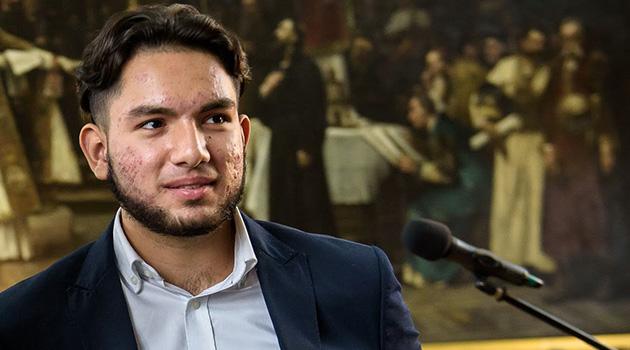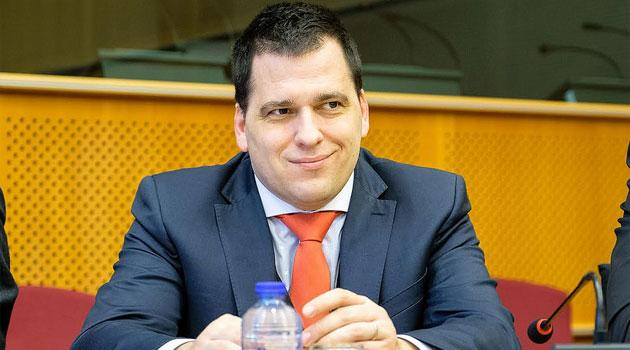Romani student at Czech college prep school learns about Romani history through BARUVAS student meetings

As a young boy, Keresztely Szinai wanted to do photography and make films. He is making his dream come true and recently produced a short film that has been appreciated by his home town.
This talented young man is doing his best to improve coexistence among different people there. Despite all his extracurricular activities and hobbies he is doing well in high school and is on the right track to go to college.
Q: You are in the second year of an economics lyceum. Do you know where you want to go after high school?
A: I would like to study economics at a college, the best would be in Prague. For the time being I am not absolutely certain which field it should be. Marketing is interesting to me in general, but my choice could change during my studies.
Q: Why did you apply to the economics lyceum in particular? What is it about economics that captivated you?
A: In the ninth grade I decided where to study further. I could only apply to two different high schools, so I chose the economics lyceum and gymnasium. The lyceum was recommended to me by my homeroom teacher, who advised me on how to choose the schools. Not all subjects interest me, so the economics lyceum was a better choice than gymnazium, where there is a very broad range of subjects.
Q: I know film and photography are what you are most fond of. Will you tell us something about that?
A: I have been intensively dedicating myself to film and photography ever since I got my first digital single-lens reflex camera, which was during eighth grade sometime. Before that I had also made videos with my friends using my mobile phone and I liked taking pictures, but I did not begin to focus on it more intensively until sometime in eighth grade.
Q: It seems to me that photography must be an expensive hobby. Is it?
A: It certainly is. If one wants quality technology, the hobby becomes more expensive. When I wanted to buy a new DSLR I had to save up the money for it a long time by doing temporary jobs, but it was worth it.
Q: Have you already enjoyed some successes in the field of film/photography?
A: My friends and I recently made a short film reflecting on contemporary problems. It tells the story of somebody who borrows money that he can’t pay back, so he is subsequently forced, because of the need to pay off the debt, to smuggle drugs into Germany – without being aware that is what he is doing. The City of Ústí nad Labem gave us an award for the film.
Q: That’s a brilliant success. Do you have time for any other hobbies?
A: I am doing my best to join discussions addressing the issue of the Ústecký Region. I was a member of my school parliament and gradually I worked my way up and eventually I led the Ústecký Regional Parliament of Children and Youth for a year, and I was also the Governor of that parliament. Last year I also sat on the National Parliament of Children and Youth, representing the Ústecký Region, and I sat on the Children’s Rights and Schools Committee there.
Q: Would you describe for us what happens during sessions of the National Parliament of Children and Youth?
A: Each session focuses on a different theme. There are many workshops, experts on that particular issue give lectures about it, and there are many other interesting activities. On the last day of the session, we all assemble in a building that is very important – last time it was the Chamber of Deputies. We then vote on which presentation from the session should be given to the bodies responsible for addressing the issue (departments, ministries).
Q: You receive a scholarship from the ROMEA organization. How has it aided you financially?
A: Thanks to the scholarship I am able to afford to commute to high school and buy supplies. Also, last year I was able, thanks to the scholarship, to afford to join my school’s trip to France. For five years I studied French in primary school, so I have now been able to test what I know in practice.
Q: What else has this scholarship made possible for you?
A: Thanks to the ROMEA organization I have begun to take a greater interest in the history of Romani people. During the BARUVAS meetings that are part of the scholarship, I have gotten to meet interesting figures. Romani people like Michal Mižigár or David Tišer are the reason why I began to take more interest in the history of the Roma. When I first applied for the scholarship I was asked to describe what it means to me to be Romani. At the time I myself didn’t know how to describe what it means, but today I know what I would write about. The scholarship is not just about money, there is much more that one gains from it.
Q: You regularly attend the BARUVAS meetings. How did you feel when you were there for the first time, and how do you perceive them today?
A: I recall that I didn’t want to go to the meeting, but I said to myself that the polite thing to do was to attend, since I have been awarded a scholarship. My concerns quickly disappeared and I really liked it. I believe these meetings are brilliant. We get to know new people, we create contacts for the future, we attend interesting lectures and workshops. The lectures by Michal Mižigár, or by Jan Ort, were brilliant and they gave me a lot of new knowledge about the culture and history of Romani people.
Q: You are working on developing an Instagram profile for BARUVAS. What are your plans for it?
A: My vision is to expand the reach of the BARUVAS program on social media. I want to add new interviews and stories to that profile, not just with scholarship recipients, but with other interesting figures. We want all people to be able to find something of interest there.
